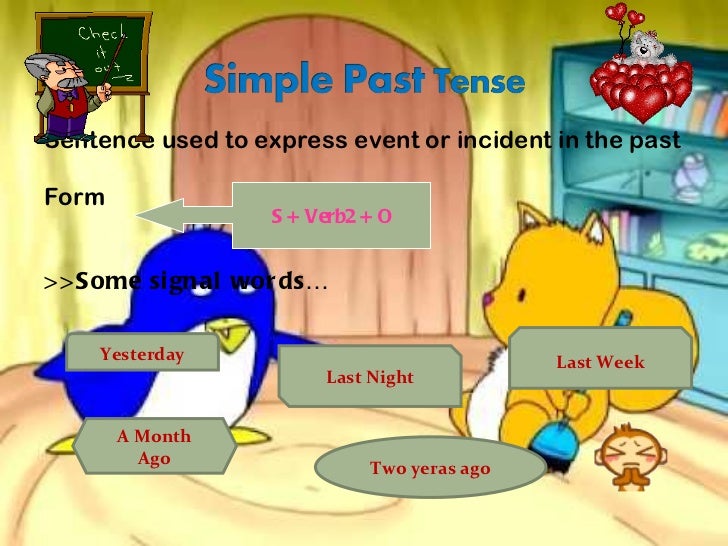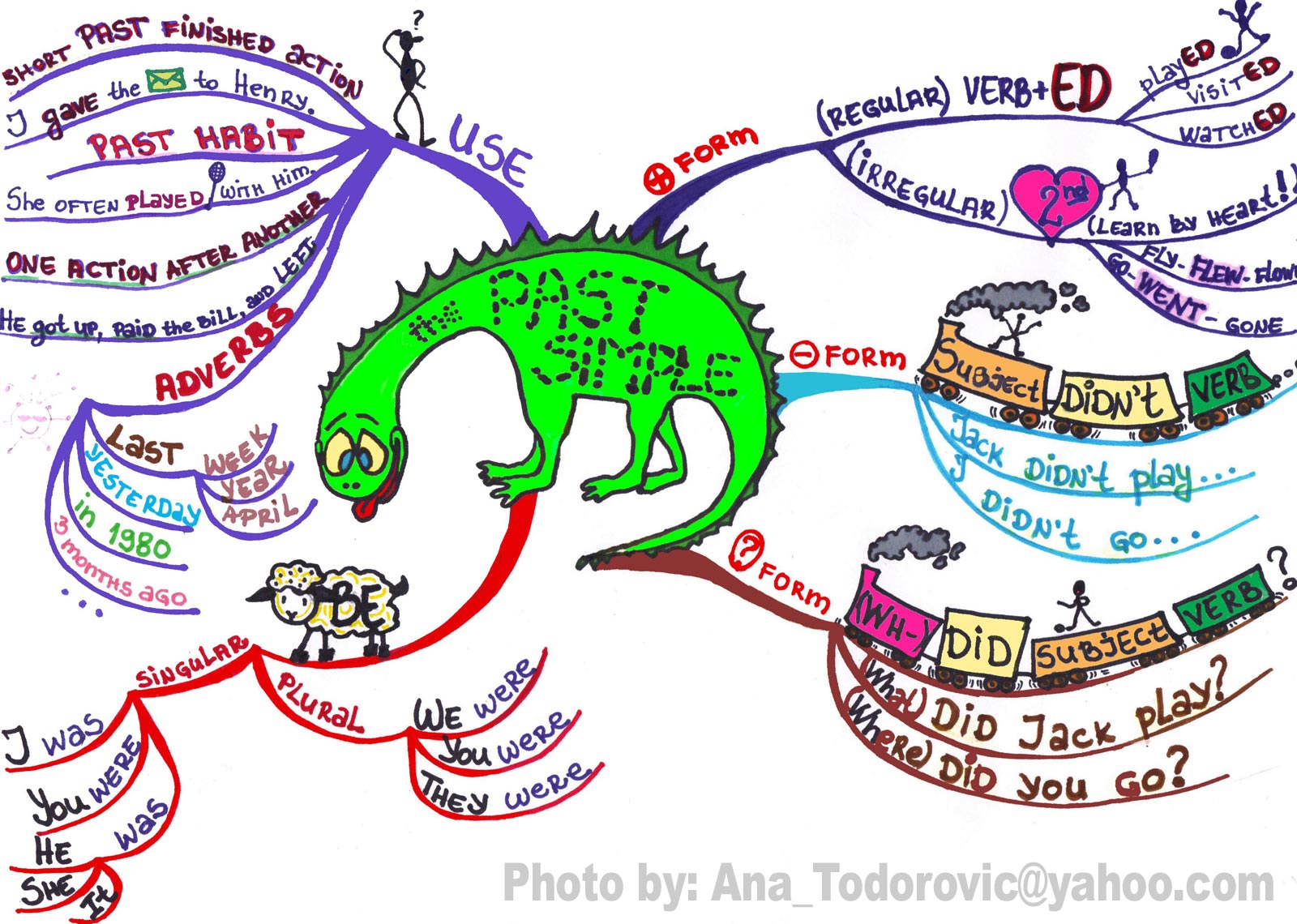miércoles, 31 de mayo de 2017
domingo, 28 de mayo de 2017
Differences Between Future Tenses
1. We use "going to" to talk about a planned activity for future.
For instance:
A: There is a good movie on TV tonight.
B: Yes. I know. I am going to watch it.
A: Why is Betty in a hurry?
B: Because she is going to meet her brother at the station at six.
2. We use "will" when we decide to do something at the time of speaking.
For instance :
A: What would you like to drink, sir?
B: I will have a glass of milk, please.
A: Oh, you have left the door open.
B: Have I? I will go and shut it.
3. We use "going to" for prediction in the near future. The speaker is sure because there are signs about it.
For instance :
She is standing at the edge of the cliff, she is going to fall.
A: What is the problem? There are strange noises in the lift.
B: I think the lift is going to break down .Let’s get out!
A: I feel cold.
B: Look at those black clouds. It is going to rain.
A: What is the matter with you?
B: I feel terrible. I think I am going to be ill.
4. We use "will" for prediction in the remote future
For instance :
A: How is he, doctor?
B: Don’t worry. He will get better.
A: The bridge is not so safe.
B: Yes. One day it will break down.
5. We use "will" for requests, invitations and offers.
For instance :
Will you shut the door, please? (Request)
Will you come to the cinema with me? (Invitation)
That bag looks very heavy. I will help you. (Offer)
6. We generally use "will" for prediction with the following verbs and phrases.
Believe , expect , hope , think , wonder , I’m sure , I’m afraid ...etc
I believe he will pass the exam.
I hope he won’t leave us.
I am afraid he will fail the exam.
Do you think they will divorce?
7. We use "will" with the adverbs Perhaps, probably, certainly
We do not use going to in this case.
Perhaps they will support you in the election.
Jackson will probably go to London next year.
8. We use "will" to express promise, not going to
I will study medicine at university.
I will stop going to the casino.
9. We use "will" in a question tag after imperative, not going to.
Do it today, will you?
Don’t look at your friend’s paper, will you?
10. We use "will" to give an order or state our wishes, not be going to.
Will you turn on the lights?
11. We use "will" to express an action in necessity in the future, not be going to.
You will have to pay a fine if you don’t pay your tax on time.
12. We use "will" for threat.
Study hard or you will fail.
Give me all your money or you will die.
domingo, 23 de abril de 2017
martes, 7 de marzo de 2017
PAST PROGRESSIVE AND PAST SIMPLE
1. The most common use of the past continuous tense is to talk about something that was happening around a particular time in the past.
- What were you doing at 8 o’clock last night? I was watching television.
I started watching television before 8 o’clock and I continued watching it after 8 o’clock.
- In 1994 he was working in a small town in Poland.
- At 6 o’clock on Saturday morning we were travelling to the airport.
2. We often use the past continuous and the past simple tense together. When this happens, the past continuous describes a longer, ‘background’ action or situation and the past simple describes the action or events.
- When I woke up this morning it was raining and my father was singing in the kitchen.
- I was walking home, whistling happily, when I saw two masked men run out of the bank.
Often, the ‘action’ described by the past simple tense interrupts the ‘situation’ described by the past continuous tense.
- I broke my leg when I was skiing.
- I was playing a computer game when the doorbell rang.
Notice that the past continuous describes ‘situations’ that go on for some time – ‘skiing’ and ‘playing’ but the past simple describes ‘actions’ that happen quickly – ‘broke’ and ‘rang’.
Notice too the important difference between these two sentences.
- When they arrived, Jeff was cooking dinner. Jeff started cooking before they arrived.
- When they arrived, Jeff cooked dinner. Jeff started cooking dinner after they arrived.
Notice too the important difference between these two sentences.
domingo, 5 de marzo de 2017
miércoles, 22 de febrero de 2017
ENGLISH EXAM
Dear Students:
Next week, on March 2nd.(thursday) and 3rd. (friday), you are going to take an English exam. This quiz will have all the grammar topics that we studied in the class.
On the other hand, you have to prepare a short oral presentation about the Aztec Mask.
Please be responsible, you have some days to study. You must read and do grammar practices using my blog. In it, you can find all the grammar topics, exercises and explanations.
Here are all the grammar points that you have to study:
Simple Present, affirmative, negative and question forms.
Simple Present as a Future (timetables and schedules)
Present Progressive and Simple Present (Stative and Action Verbs)
Simple Past tense
Also, the quiz will have reading comprehension and writing practice.
Regards,
Teacher Jenny
Next week, on March 2nd.(thursday) and 3rd. (friday), you are going to take an English exam. This quiz will have all the grammar topics that we studied in the class.
On the other hand, you have to prepare a short oral presentation about the Aztec Mask.
Please be responsible, you have some days to study. You must read and do grammar practices using my blog. In it, you can find all the grammar topics, exercises and explanations.
Here are all the grammar points that you have to study:
Simple Present, affirmative, negative and question forms.
Simple Present as a Future (timetables and schedules)
Present Progressive and Simple Present (Stative and Action Verbs)
Simple Past tense
Also, the quiz will have reading comprehension and writing practice.
Regards,
Teacher Jenny
lunes, 13 de febrero de 2017
domingo, 8 de enero de 2017
THE SIMPLE PAST TENSE
FORM
[VERB+ed] or irregular verbs
Examples:
- You called Debbie.
- Did you call Debbie?
- You did not call Debbie.
1.- Completed Action in the Past
Use the Simple Past to express the idea that an action started and finished at a specific time in the past. Sometimes, the speaker may not actually mention the specific time, but they do have one specific time in mind.
Examples:
2.- A Series of Completed Actions
We use the Simple Past to list a series of completed actions in the past. These actions happen 1st, 2nd, 3rd, 4th, and so on.
- I saw a movie yesterday.
- I didn't see a play yesterday.
- Last year, I traveled to Japan.
- Last year, I didn't travel to Korea.
- Did you have dinner last night?
- She washed her car.
- He didn't wash his car.
2.- A Series of Completed Actions
We use the Simple Past to list a series of completed actions in the past. These actions happen 1st, 2nd, 3rd, 4th, and so on.
Examples:
3.- Duration in Past
The Simple Past can be used with a duration which starts and stops in the past. A duration is a longer action often indicated by expressions such as: for two years, for five minutes, all day, all year, etc.
- I finished work, walked to the beach, and found a nice place to swim.
- He arrived from the airport at 8:00, checked into the hotel at 9:00, and met the others at 10:00.
- Did you add flour, pour in the milk, and then add the eggs?
3.- Duration in Past
The Simple Past can be used with a duration which starts and stops in the past. A duration is a longer action often indicated by expressions such as: for two years, for five minutes, all day, all year, etc.
Examples:
- I lived in Brazil for two years.
- Shauna studied Japanese for five years.
- They sat at the beach all day.
- They did not stay at the party the entire time.
- We talked on the phone for thirty minutes.
- A: How long did you wait for them?
B: We waited for one hour.
Suscribirse a:
Entradas (Atom)


%2Bcontrast.png)

